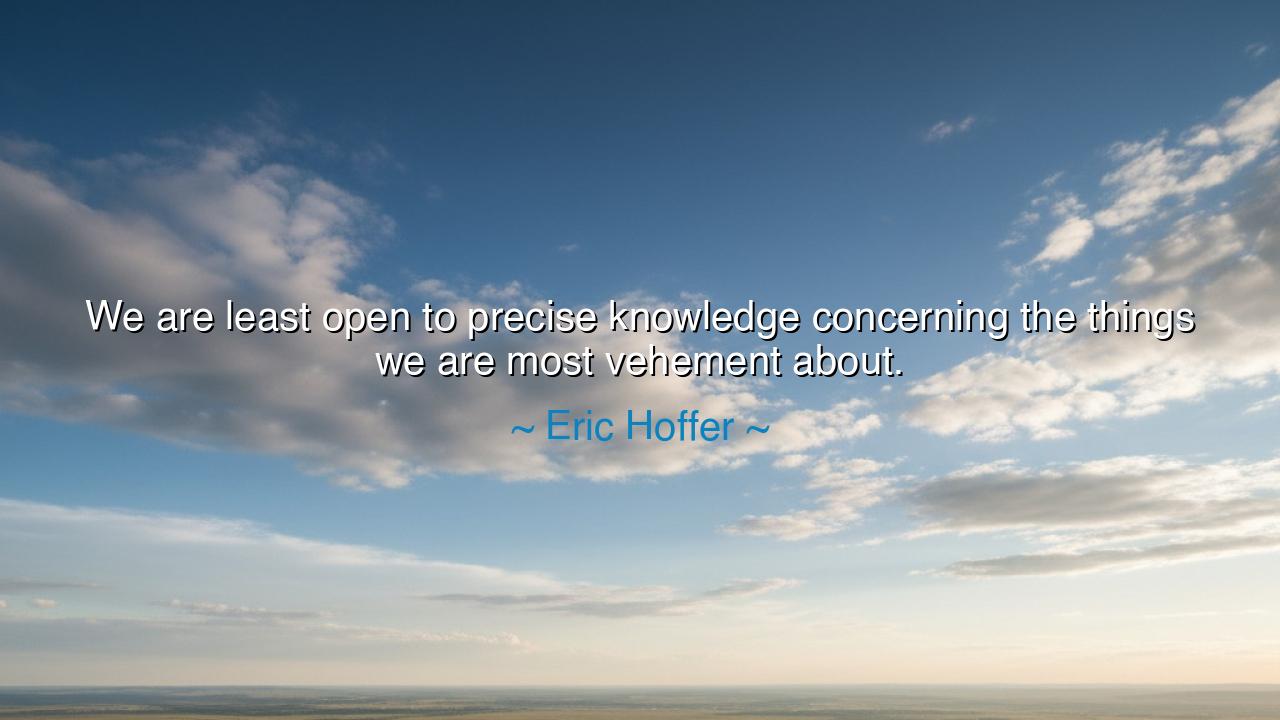
We are least open to precise knowledge concerning the things we
We are least open to precise knowledge concerning the things we are most vehement about.






Eric Hoffer, the longshoreman philosopher, once spoke with piercing simplicity: “We are least open to precise knowledge concerning the things we are most vehement about.” In these words, he revealed a paradox of the human spirit—that the more passionately we cling to a belief, the less willing we are to see it clearly. Our fire blinds us, our zeal deafens us, and we mistake the heat of emotion for the light of truth.
The meaning of this wisdom is sharp and humbling. When we feel strongly—when we are vehement—our pride clings to certainty. To admit error would wound our ego, to accept new knowledge would threaten the foundation of our conviction. Thus, we close our eyes to evidence, we harden our hearts against reason, and we exalt passion above truth. Hoffer warns that in this state, even the clearest facts cannot penetrate, for the soul has built its fortress against them.
History gives us countless examples. Consider the trial of Galileo. The Church in his day held fiercely to the belief that the Earth stood at the center of creation. This was not merely a theory, but a passion, woven into faith and identity. When Galileo’s telescope revealed moons circling Jupiter and planets wandering against the stars, it was knowledge, precise and undeniable. Yet the very vehemence with which the belief in geocentrism was held made men blind. They condemned him not because the evidence was weak, but because their passion was too strong to let the truth enter.
The ancients, too, understood this danger. Plato warned of the “noble lie,” where belief, once bound to the soul, resists the intrusion of reason. In the Agora of Athens, men argued fiercely about justice, the gods, and the order of society. Yet Socrates, who questioned their passions with cold knowledge, was condemned to drink the hemlock. Here again, emotion triumphed over reason, and the one who sought truth was silenced by those who were most vehement in their ignorance.
Hoffer himself wrote in the aftermath of great wars and revolutions. He saw how mass movements, driven by zeal, clung to ideas with a fervor that no fact could pierce. Whether fascist or communist, nationalist or fanatic, their very vehemence made them impervious to knowledge. The louder their cries, the less willing they were to question their assumptions. He knew that passion untempered by truth leads not to freedom, but to fanaticism.
The lesson for us is urgent. Beware of the subjects about which you feel most vehement, for there your blindness may be greatest. When anger or devotion burns within you, pause, and ask: Am I still open to knowledge? Or has my passion built walls against the truth? True strength is not to cling to certainty, but to remain teachable, to let reason temper zeal, and to let facts refine faith.
So what must you do? Practice humility in debate. Seek out voices that challenge you, not only those that echo your own. When your heart rises in passion, let your mind rise in caution. Do not despise knowledge that unsettles your convictions, for it may be the very truth you need. And above all, do not confuse being loud with being right, nor being vehement with being wise.
Thus, remember Eric Hoffer’s words: “We are least open to precise knowledge concerning the things we are most vehement about.” Carry them as a mirror to your soul. For passion without truth is a storm without stars, but passion guided by knowledge is the fire that lights the way forward.






AAdministratorAdministrator
Welcome, honored guests. Please leave a comment, we will respond soon